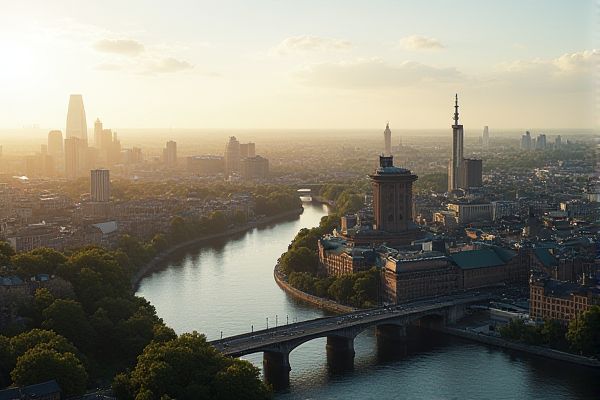
Cultural and recreational activities in Germany: Oktoberfest in Munich: Beer festival. Christmas Markets: Holiday shopping and festivities. Traditional German music: Oompah bands. Castle tours: Neuschwanstein and others. Berlin Wall Memorial: Historical significance. Bavarian Alps: Skiing and hiking. Rhine River cruises: Scenic views. German cuisine: Bratwurst and pretzels. Art museums: Berlin and Dresden. Bundesliga: German football league.
Oktoberfest in Munich: Beer festival.
Oktoberfest in Munich is the world's largest beer festival, held annually from late September to early October. This event celebrates Bavarian culture with massive beer tents, traditional cuisine, parades, rides, and attractions, as well as traditional music and dancing. Attracting millions of global visitors, the Oktoberfest offers a unique experience filled with rich traditions and vibrant festivities.
Christmas Markets: Holiday shopping and festivities.
German Christmas markets, such as the Heidelberg Christmas Market, offer a rich cultural and recreational experience with holiday shopping, traditional food, mulled wine, and festive activities like ice skating, carousels, and visits to various decorated market areas like Bismarckplatz, Anatomiegarten, and Universitatsplatz, from late November to early January. These markets feature handicrafts, Christmas decorations, and local cuisine, creating a joyful and atmospheric holiday setting.
Traditional German music: Oompah bands.
Traditional German music, particularly Oompah bands, is characterized by horn-centric music featuring brass instruments like the tuba, along with accordions, and is often associated with folk genres such as polkas, waltzes, and marches. These bands are a staple at German cultural events like Oktoberfest and biergartens, and their music has a significant influence on German Culture and Traditions globally.
Castle tours: Neuschwanstein and others.
Neuschwanstein Castle tours offer a comprehensive experience, including guided visits to the castle's interior and exterior, scenic views of Hohenschwangau Castle, and the surrounding Bavarian landscape. With options for skip-the-line tickets and various modes of transportation from Munich, visitors can enjoy a seamless journey to this iconic destination. For more details about planning your visit, explore the offerings available on the Radius Tours website to ensure a memorable and convenient trip.
Berlin Wall Memorial: Historical significance.
The Berlin Wall Memorial, located on Bernauer Strasse, is a significant cultural and historical site that commemorates the division of Berlin and the victims of the Berlin Wall. It includes a preserved section of the wall, a documentation center, a viewing platform, the Chapel of Reconciliation, and an open-air exhibition, providing a comprehensive insight into the history of the Berlin Wall and its impact on the city and its people. You can explore more about this monumental site by visiting the Berlin Wall Memorial website for further information.
Bavarian Alps: Skiing and hiking.
The Bavarian Alps provide an impressive variety of recreational activities, catering to both winter sports enthusiasts and summertime adventurers. In the winter months, visitors can indulge in skiing, snowboarding, cross-country skiing, and serene snow hiking. Come summer, the mountains transform, revealing extensive hiking trails such as the Salzalpensteig and paths around Lake Chiemsee, Walchensee, and various other picturesque locations. Additionally, the region is steeped in rich cultural experiences, offering traditional events, historic sites, and delectable local cuisine. For more detailed insights into what these majestic mountains hold, consider exploring this [website](https://www.invest-in-bavaria.com/en/blog/post/the-bavarian-alps-mountains-for-relaxing-and-getting-active) dedicated to The Bavarian Alps.
Rhine River cruises: Scenic views.
Rhine River cruises offer scenic views of historic castles, fairytale villages, and cultural centers, including Amsterdam's canals, the windmills of Kinderdijk, Cologne's Gothic Dom, Rudesheim's wine-growing region, and the breathtaking Black Forest, providing a rich cultural and recreational experience. For more details on this enchanting journey, visit the Rhine River Cruises page.
German cuisine: Bratwurst and pretzels.
German cuisine heavily features Bratwurst and pretzels, with Bratwurst being a staple pork sausage often grilled or fried, and pretzels traditionally made with wheat flour, malt, and salt. These pretzels are often enjoyed with mustard, cheese dips, or paired with other sausages like Weisswurst in Bavarian culture. To delve deeper into the historical journey of these iconic twisted breads, The Spruce Eats provides an informative overview of German Pretzel History, illustrating their significance and enduring popularity in German gastronomy.
Art museums: Berlin and Dresden.
In Berlin, the cultural hub is Museum Island, a UNESCO World Heritage Site featuring the Altes Museum, Neues Museum, Old National Gallery, Bode Museum, and Pergamon Museum, showcasing art and cultures from ancient to modern times. Situated in the vibrant heart of the city, this island is a testament to the enduring power of art, and its collection spans an impressive range of epochs and styles. You can plan your visit to Berlin's Museums and easily explore these magnificent treasures. In Dresden, the Gemaldegalerie Alte Meister at the Zwinger Palace is renowned for its collection of masterpieces from the 15th to 18th centuries, including works by Raphael, Rembrandt, and Vermeer, highlighting Italian Renaissance and Dutch and Flemish art.
Bundesliga: German football league.
The Bundesliga, Germany's top football league, is renowned for its high attendance rates, electric matchday atmosphere, and affordable ticket prices. The league, founded in 1963, is known for its intense fan culture, including pre-match displays like tifos, and its financial and organizational strength, making it one of the world's premier soccer leagues.
